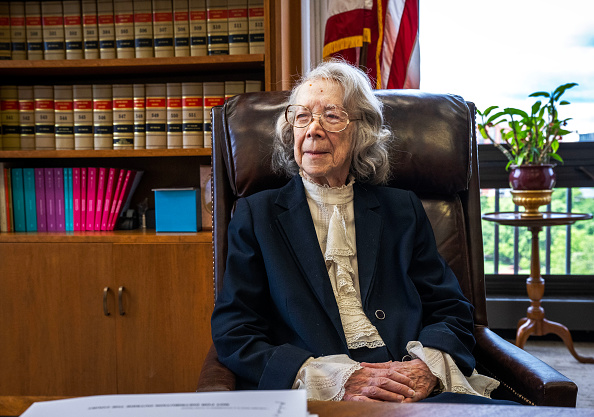Letters: Immigrant rights
With regard to “Web 100,” December, thank you for increasing awareness of human rights and immigration law by adding RAICES [Refugee and Immigrant Center for Education and Legal Services] to your list of best legal Twitter accounts. This organization is on the front line, protecting the rights of families and children! Thanks!
Jean Longwill
Portland, Oregon
I read the “Editor’s Note,” January-February, that you are moving to fewer issues. Just wanted you to know that the Journal has improved 1,000 percent over what it was. You are doing a really good job. Thank you.
Brenda P. Murray
Washington, D.C.
‘NOT A SOLUTION’
While we appreciate the attention the Journal has paid to the issue of people wrongfully imprisoned or otherwise held with no legal order to detain and agree that a prison is not the place for anyone in psychiatric crisis (“Breakdown,” January-February), we believe that there are better alternatives to adding psychiatric hospital beds. The National Association for Rights Protection and Advocacy is a group of attorneys, advocates, people with psychiatric histories and others who advocate for least restrictive services and individuals’ right to make their own treatment decisions.
There are more accurate information sources about the legal rights of people with psychiatric diagnoses than the Treatment Advocacy Center. Sources of more reliable data include NARPA, the National Disability Rights Network (the national nonprofit membership organization representing the network of congressionally mandated, legally based disability rights agencies) and the Bazelon Center for Mental Health Law.
Adding more hospital beds is not a solution to the problems mentioned in the article. The real problem is often a lack of affordable housing and insufficient funding for home- and community-based supports and services for individuals, including peer support and alternatives, such as the Hearing Voices Network.
Ann Rider
Tacoma, Washington
gARNER rules
Some of what Bryan A. Garner’s article “Plain Talk,” January-February, advocates are of questionable utility. A convoluted sentence that expresses an inherently complicated concept can sometimes be simplified only with a loss of critical detail or by replacing one long sentence with many short sentences in order to define terms and to cover all the qualifications and exceptions. Pick your poison, as a very succinct statement goes.
This issue arises in other fields as well. Einstein’s theory of general relativity can be expressed in a very elegant equation, one form of which is Gμv + Λgμv = (8πG/c4)Tμv. But the equation conveys no information whatsoever without an understanding of the meanings and significance of all those letters and symbols.
Rudolf Flesch’s final point in the article is troublesome. Since there is no official arbiter of English grammar, usage and pronunciation, Mr. Flesch posits that the governing principle is majority rule. But there is obviously no practical method of polling everyone who speaks or writes English, and even if there were, the notion of a uniform majority rule would be misleading because developments occur over time in different directions, in different regions, within different distinct groups, for different purposes. In light of those considerations, quizzes on pronunciation have a “gotcha” feel to them, since as long as there is no loss of clarity, there is little practical need to care which syllable is stressed in the oral pronunciation of a word. On the other hand, an idea’s meaning can be muddled, and precision can be lost when traditional rules of usage are broken or abandoned, as in Mr. Flesch’s example of blithely getting rid of the subjunctive. The sentence, “If I was the King of England, a horse has six legs,” is a true statement, at least as a matter of formal logic, while, “If I were the King of England, a horse would have six legs,” is a highly dubious proposition.
Robert Kantowitz
Lawrence, New York
‘LANGUAGE NUT’
Thank you for Bryan A. Garner’s wonderful article, “Contract ‘Busts’,” December, I’m a 30-year lawyer and a 20-year contract lawyer. And though I freely admit being guilty of many of the drafting transgressions you described, in the last few years I have seen the error of my ways, and I’ve been working against such busts, one contract at a time. I was an English major in college, and I’m still something of a language nut (I’m a volunteer adult writing-skills teacher and a big fan of The Elements of Style). Things like the difference in meaning between “may” and “shall” are quite meaningful to me, and I’ve always had a problem keeping “lessor” and “lessee” straight.
Kudos and congratulations for your hard and very important work with LawProse.org.
Dan Tatum
Dallas
free speech
In Bob Carlson’s President’s Message, “America: The Resilient Land of the Free,” November, he manages, in one paragraph, to both extol and condemn free speech, hardly missing a breath. How can he be an honest proponent of free speech while providing examples of speech that he refuses to tolerate? I am sad to see that our organization has elevated to its presidency a man who apparently believes that only speech that he supports is to be allowed or defended. I am hopeful that his constituency is more in the camp of Voltaire, who said, “I detest what you write, but I would give my life to make it possible for you to continue to write.”
I, of course, will defend to my death President Carlson’s right to express his self-contradicting views in a single paragraph so that those reading the views can fairly evaluate them.
George M. Walker
Mobile, Alabama
You may submit a letter by email to [email protected] or via mail: Attn: Letters, ABA Journal, 321 N. Clark St. Chicago, IL 60654. Letters must concern articles published in the Journal. They may be edited for clarity or space. Be sure to include your name, city and state, and email address. Read more Letters to the Editor from the ABA Journal magazine.



